tutorial, commentary, study resources, plot, and web links
Longstaff’s Marriage first appeared in magazine form in Scribner’s Monthly for August 1878. Stories by popular writers Bret Harte and Edward Egglestone appeared in the same issue, It was then reprinted in book form amongst The Madonna of the Future and Other Stories the following year.
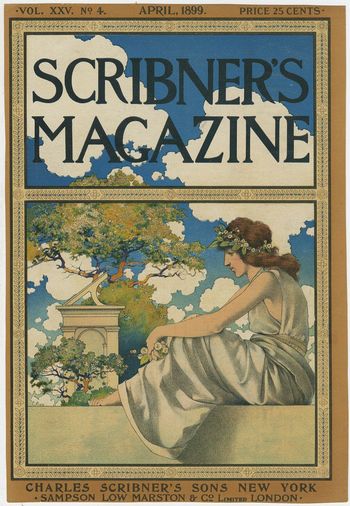
Longstaff’s Marriage – critical commentary
The principal feature of this story is the structural symmetry and the ironic reversals of the two ‘deathbed’ scenes. In the first the proud and beautiful Diana seems to have everything to gain when Longstaff makes his appeal to her, but she rejects his offer indignantly.
We are then asked to believe in two outcomes from this episode. The first is that the shock of this rejection somehow gives Longstaff the jolt he needs to restore his own health. Since we have no medical information about his state of being during his period of decline, this is very hard to judge.
The other is that at the same time Diana somehow retrospectively falls in love with Longstaff – even though she does not see him for more than two years. This is something of a stretch, but just about plausible.
But then comes another symmetrical twist which stretches credulity – to breaking point. Diana herself develops a wasting ailment which would be acceptable if she were simply pining away for love of Longstaff and might be restored on resumption of contact with him. Her proposal to him is acceptable enough as the neat plot twist – but she really is on her death bed and dies shortly afterwards.
This seems like a gain for plot structure at the expense of plausibility. The architecture of the story is firm enough, but its content is not satisfactory.
Longstaff’s Marriage – study resources
![]() The Complete Works of Henry James – Kindle edition – Amazon UK
The Complete Works of Henry James – Kindle edition – Amazon UK
![]() The Complete Works of Henry James – Kindle edition – Amazon US
The Complete Works of Henry James – Kindle edition – Amazon US
![]() Complete Stories 1874—1884 – Library of America – Amazon UK
Complete Stories 1874—1884 – Library of America – Amazon UK
![]() Complete Stories 1874—1884 – Library of America – Amazon US
Complete Stories 1874—1884 – Library of America – Amazon US
![]() Longstaff’s Marriage – Kindle edition
Longstaff’s Marriage – Kindle edition
![]() Longstaff’s Marriage – Paperback edition [£4.49]
Longstaff’s Marriage – Paperback edition [£4.49]
![]() Longstaff’s Marriage – eBook versions at Gutenberg
Longstaff’s Marriage – eBook versions at Gutenberg
![]() The Cambridge Companion to Henry James – Amazon UK
The Cambridge Companion to Henry James – Amazon UK
![]() Henry James at Wikipedia – biographical notes, links
Henry James at Wikipedia – biographical notes, links
![]() Henry James at Mantex – tutorials, biography, study resources
Henry James at Mantex – tutorials, biography, study resources
Longstaff’s Marriage – plot summary
Diana Belfield has inherited money and divided it with her cousin Agatha Gosling. The two women travel to Europe and are in Nice for the winter season. Agatha is much given to fantasising about their fellow residents, and they see Reginald Longstaff on the promenade regularly, she assumes that he is in love with Diana.
Longstaff introduces himself to Agatha and reveals that he is dying and very much in love with Diana. He asks Agatha not to reveal this to Diana until after his death.
Agatha keeps her promise, but some time later Longstaff’s servant asks Agatha to bring Diana to Longstaff’s sick bed, where he is thought to be dying. When they go there, he makes a moving appeal to Diana, asking her to marry him. Diana insists that she finds the idea appalling and suggests that they leave Nice immediately.
Their subsequent travels deteriorate in quality, so they decide to go back to America.Two years later Diana writes to Agatha to say that she is engaged – but then breaks it off. Diana then summons Agatha to say that she is dying and wants to go back to Europe. Diana is eager to travel widely before she dies, and they end up in Rome, where they meet Longstaff again.
Diana reveals to Agatha that she has been in love with Longstaff ever since refusing his offer of marriage, and she now believes he has recovered because of the hurt she inflicted on him. The implication is that she in her turn is now ‘dying of love’.
Agatha is sent in search of Longstaff, and when he visits the dying Diana it is she who proposes to him. The next day they are married, and shortly afterwards she dies.
Principal characters
| Diana Belfield | a tall, attractive, proud, American heiress |
| Agatha Gosling | her cousin |
| Reginald Longstaff | a young Englishman from an old, high-toned family |
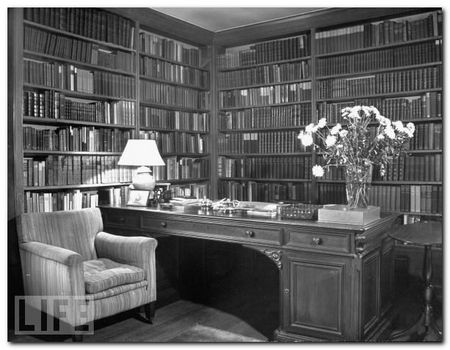
Henry James’s study
Further reading
Biographical
![]() Theodora Bosanquet, Henry James at Work, University of Michigan Press, 2007.
Theodora Bosanquet, Henry James at Work, University of Michigan Press, 2007.
![]() F.W. Dupee, Henry James: Autobiography, Princeton University Press, 1983.
F.W. Dupee, Henry James: Autobiography, Princeton University Press, 1983.
![]() Leon Edel, Henry James: A Life, HarperCollins, 1985.
Leon Edel, Henry James: A Life, HarperCollins, 1985.
![]() Philip Horne (ed), Henry James: A Life in Letters, Viking/Allen Lane, 1999.
Philip Horne (ed), Henry James: A Life in Letters, Viking/Allen Lane, 1999.
![]() Henry James, The Letters of Henry James, Adamant Media Corporation, 2001.
Henry James, The Letters of Henry James, Adamant Media Corporation, 2001.
![]() Fred Kaplan, Henry James: The Imagination of Genius, Johns Hopkins University Press, 1999
Fred Kaplan, Henry James: The Imagination of Genius, Johns Hopkins University Press, 1999
![]() F.O. Matthieson (ed), The Notebooks of Henry James, Oxford University Press, 1988.
F.O. Matthieson (ed), The Notebooks of Henry James, Oxford University Press, 1988.
Critical commentary
![]() Elizabeth Allen, A Woman’s Place in the Novels of Henry James London: Macmillan Press, 1983.
Elizabeth Allen, A Woman’s Place in the Novels of Henry James London: Macmillan Press, 1983.
![]() Ian F.A. Bell, Henry James and the Past, London: Palgrave Macmillan, 1993.
Ian F.A. Bell, Henry James and the Past, London: Palgrave Macmillan, 1993.
![]() Millicent Bell, Meaning in Henry James, Cambridge (MA): Harvard University Press, 1993.
Millicent Bell, Meaning in Henry James, Cambridge (MA): Harvard University Press, 1993.
![]() Harold Bloom (ed), Modern Critical Views: Henry James, Chelsea House Publishers, 1991.
Harold Bloom (ed), Modern Critical Views: Henry James, Chelsea House Publishers, 1991.
![]() Kirstin Boudreau, Henry James’s Narrative Technique, Macmillan, 2010.
Kirstin Boudreau, Henry James’s Narrative Technique, Macmillan, 2010.
![]() J. Donald Crowley and Richard A. Hocks (eds), The Wings of the Dove, New York: W.W. Norton and Company, 1978.
J. Donald Crowley and Richard A. Hocks (eds), The Wings of the Dove, New York: W.W. Norton and Company, 1978.
![]() Victoria Coulson, Henry James, Women and Realism, Cambridge University Press, 2009.
Victoria Coulson, Henry James, Women and Realism, Cambridge University Press, 2009.
![]() Daniel Mark Fogel, A Companion to Henry James Studies, Greenwood Press, 1993.
Daniel Mark Fogel, A Companion to Henry James Studies, Greenwood Press, 1993.
![]() Virginia C. Fowler, Henry James’s American Girl: The Embroidery on the Canvas, Madison (Wis): University of Wisconsin Press, 1984.
Virginia C. Fowler, Henry James’s American Girl: The Embroidery on the Canvas, Madison (Wis): University of Wisconsin Press, 1984.
![]() Jonathan Freedman, The Cambridge Companion to Henry James, Cambridge University Press, 1998.
Jonathan Freedman, The Cambridge Companion to Henry James, Cambridge University Press, 1998.
![]() Judith Fryer, The Faces of Eve: Women in the Nineteenth Century American Novel, Oxford: Oxford University Press, 1976
Judith Fryer, The Faces of Eve: Women in the Nineteenth Century American Novel, Oxford: Oxford University Press, 1976
![]() Roger Gard (ed), Henry James: The Critical Heritage, London: Routledge, 1968.
Roger Gard (ed), Henry James: The Critical Heritage, London: Routledge, 1968.
![]() Tessa Hadley, Henry James and the Imagination of Pleasure, Cambridge University Press, 2009.
Tessa Hadley, Henry James and the Imagination of Pleasure, Cambridge University Press, 2009.
![]() Barbara Hardy, Henry James: The Later Writing (Writers & Their Work), Northcote House Publishers, 1996.
Barbara Hardy, Henry James: The Later Writing (Writers & Their Work), Northcote House Publishers, 1996.
![]() Richard A. Hocks, Henry James: A study of the short fiction, New York: Twayne Publishers, 1990.
Richard A. Hocks, Henry James: A study of the short fiction, New York: Twayne Publishers, 1990.
![]() Donatella Izzo, Portraying the Lady: Technologies of Gender in the Short Stories of Henry James, University of Nebraska Press, 2002.
Donatella Izzo, Portraying the Lady: Technologies of Gender in the Short Stories of Henry James, University of Nebraska Press, 2002.
![]() Colin Meissner, Henry James and the Language of Experience, Cambridge University Press, 2009
Colin Meissner, Henry James and the Language of Experience, Cambridge University Press, 2009
![]() John Pearson (ed), The Prefaces of Henry James, Pennsylvania State University Press, 1993.
John Pearson (ed), The Prefaces of Henry James, Pennsylvania State University Press, 1993.
![]() Richard Poirer, The Comic Sense of Henry James, Oxford: Oxford University Press, 1967.
Richard Poirer, The Comic Sense of Henry James, Oxford: Oxford University Press, 1967.
![]() Hugh Stevens, Henry James and Sexuality, Cambridge University Press, 1998.
Hugh Stevens, Henry James and Sexuality, Cambridge University Press, 1998.
![]() Merle A. Williams, Henry James and the Philosophical Novel, Cambridge University Press, 1993.
Merle A. Williams, Henry James and the Philosophical Novel, Cambridge University Press, 1993.
![]() Judith Woolf, Henry James: The Major Novels, Cambridge University Press, 1991.
Judith Woolf, Henry James: The Major Novels, Cambridge University Press, 1991.
![]() Ruth Yeazell (ed), Henry James: A Collection of Critical Essays, Longmans, 1994.
Ruth Yeazell (ed), Henry James: A Collection of Critical Essays, Longmans, 1994.
Other works by Henry James
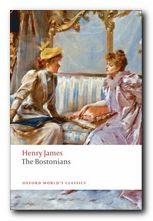 The Bostonians (1886) is a novel about the early feminist movement. The heroine Verena Tarrant is an ‘inspirational speaker’ who is taken under the wing of Olive Chancellor, a man-hating suffragette and radical feminist. Trying to pull her in the opposite direction is Basil Ransom, a vigorous young man to whom Verena becomes more and more attracted. The dramatic contest to possess her is played out with some witty and often rather sardonic touches, and as usual James keeps the reader guessing about the outcome until the very last page.
The Bostonians (1886) is a novel about the early feminist movement. The heroine Verena Tarrant is an ‘inspirational speaker’ who is taken under the wing of Olive Chancellor, a man-hating suffragette and radical feminist. Trying to pull her in the opposite direction is Basil Ransom, a vigorous young man to whom Verena becomes more and more attracted. The dramatic contest to possess her is played out with some witty and often rather sardonic touches, and as usual James keeps the reader guessing about the outcome until the very last page.
![]() Buy the book at Amazon UK
Buy the book at Amazon UK
![]() Buy the book at Amazon US
Buy the book at Amazon US
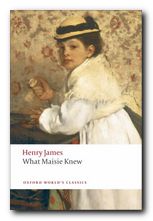 What Masie Knew (1897) A young girl is caught between parents who are in the middle of personal conflict, adultery, and divorce. Can she survive without becoming corrupted? It’s touch and go – and not made easier for the reader by the attentions of an older man who decides to ‘look after’ her. This comes from the beginning of James’s ‘Late Phase’, so be prepared for longer and longer sentences. In fact it’s said that whilst composing this novel, James switched from writing longhand to using dictation – and it shows if you look carefully enough – part way through the book.
What Masie Knew (1897) A young girl is caught between parents who are in the middle of personal conflict, adultery, and divorce. Can she survive without becoming corrupted? It’s touch and go – and not made easier for the reader by the attentions of an older man who decides to ‘look after’ her. This comes from the beginning of James’s ‘Late Phase’, so be prepared for longer and longer sentences. In fact it’s said that whilst composing this novel, James switched from writing longhand to using dictation – and it shows if you look carefully enough – part way through the book.
![]() Buy the book at Amazon UK
Buy the book at Amazon UK
![]() Buy the book at Amazon US
Buy the book at Amazon US
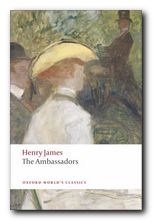 The Ambassadors (1903) Lambert Strether is sent from America to Paris to recall Chadwick Newsome, a young man who is reported to be compromising himself by an entanglement with a wicked woman. However, Strether’s mission fails when he is seduced by the social pleasures of the European capital, and he takes Newsome’s side. So a second ambassador is dispatched in the form of the more determined Sarah Pocock. She delivers an ultimatum which is resisted by the two young men, but then an accident reveals unpleasant truths to Strether, who is faced by a test of loyalty between old Europe and the new USA. This edition presents the latest scholarship on James and includes an introduction, notes, selected criticism, a text summary and a chronology of James’s life and times.
The Ambassadors (1903) Lambert Strether is sent from America to Paris to recall Chadwick Newsome, a young man who is reported to be compromising himself by an entanglement with a wicked woman. However, Strether’s mission fails when he is seduced by the social pleasures of the European capital, and he takes Newsome’s side. So a second ambassador is dispatched in the form of the more determined Sarah Pocock. She delivers an ultimatum which is resisted by the two young men, but then an accident reveals unpleasant truths to Strether, who is faced by a test of loyalty between old Europe and the new USA. This edition presents the latest scholarship on James and includes an introduction, notes, selected criticism, a text summary and a chronology of James’s life and times.
![]() Buy the book at Amazon UK
Buy the book at Amazon UK
![]() Buy the book at Amazon US
Buy the book at Amazon US
© Roy Johnson 2013
Henry James – web links
![]() Henry James at Mantex
Henry James at Mantex
Biographical notes, study guides, tutorials on the Complete Tales, book reviews. bibliographies, and web links.
![]() The Complete Works
The Complete Works
Sixty books in one 13.5 MB Kindle eBook download for £1.92 at Amazon.co.uk. The complete novels, stories, travel writing, and prefaces. Also includes his autobiographies, plays, and literary criticism – with illustrations.
![]() The Ladder – a Henry James website
The Ladder – a Henry James website
A collection of eTexts of the tales, novels, plays, and prefaces – with links to available free eTexts at Project Gutenberg and elsewhere.
![]() A Hyper-Concordance to the Works
A Hyper-Concordance to the Works
Japanese-based online research tool that locates the use of any word or phrase in context. Find that illusive quotable phrase.
![]() The Henry James Resource Center
The Henry James Resource Center
A web site with biography, bibliographies, adaptations, archival resources, suggested reading, and recent scholarship.
![]() Online Books Page
Online Books Page
A collection of online texts, including novels, stories, travel writing, literary criticism, and letters.
![]() Henry James at Project Gutenberg
Henry James at Project Gutenberg
A major collection of eTexts, available in a variety of eBook formats.
![]() The Complete Letters
The Complete Letters
Archive of the complete correspondence (1855-1878) work in progress – published by the University of Nebraska Press.
![]() The Scholar’s Guide to Web Sites
The Scholar’s Guide to Web Sites
An old-fashioned but major jumpstation – a website of websites and resouces.
![]() Henry James – The Complete Tales
Henry James – The Complete Tales
Tutorials on the complete collection of over one hundred tales, novellas, and short stories.
More tales by James
More on literature
More on the novella
More on literary studies
More on short stories
